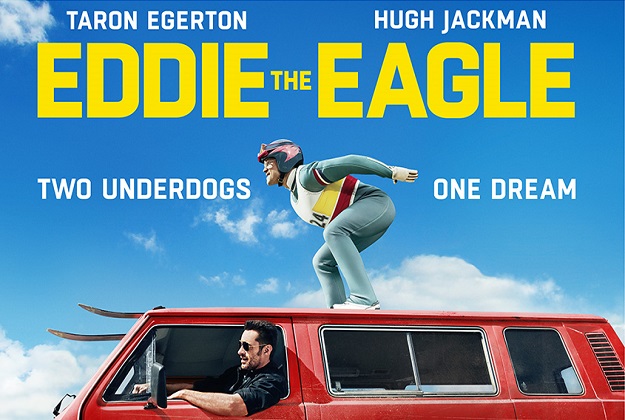Eddie The Eagle Review

The Plot
Inspired by real life sporting events, a determined young British athlete Eddie Edwards sets out to compete in the 1988 winter Olympics in the most dangerous event of Ski jumping. Sacrificing everything he faces ridicule and overcomes the opposition of fellow athletes on his quest to fulfil his implausible but inspiring Olympic dream
The Good
Eddie the Eagle Edwards is a memorable and much beloved sporting icon who has come to symbolise the true Olympic spirit. Easily deserving of big screen celebration this film will remind older audiences of his death defying feats and introduce new generations to them.
Eddie was a likeable and utterly unique young man, remembered as much for his oversized glasses, jutting chin and constant happy grin as for his unprecedented sporting feats. Rising British star Taron Egerton transforms himself convincingly to capture the charming mannerisms and instantly recognisable physical presence of the ski jumping eccentric. Egerton’s emotionally sincere performance ensures that the film also never runs any danger of inadvertently turning Edwards into a figure of ridicule. In less capable hands it would have been very easy to merely turn Eddie into a clueless slapstick buffoon.
Thankfully star Egerton and director Dexter Fletcher treat Edwards with respect, looking beyond his affectionate ‘Eagle’ nickname and famously enthusiastic antics to explore what drove him to literally risk life and limb in pursuit of participating in the Olympics. Though the film takes considerable artistic licence with Eddie’s actual journey it remains a fair reflection of who he was and what he achieved against considerable odds on the world’s biggest sporting stage.
Hugh Jackman works very well with Egerton, playing the Eddie’s invented coach, a disgraced former champion grudgingly won over by Eddie’s irrepressible determination and sporting enthusiasm. His character allows the film to more neatly adhere to the satisfying sporting movie clichés. It may be pure fiction but the reluctant coaching figure allows audiences to enjoy flamboyant training montages and allows the film to more easily articulate the emotions and motivations behind Eddie’s Olympic dream.
Making Eddie’s coach a macho former champion who squandered his natural athleticism provides a slightly heavy handed but convenient contrast to Eddie’s unassuming physique but unfaltering spirit.
Overall the film’s soundtrack and costumes also have considerable fun with the 1980s backdrop. Garishly coloured winter sports attire combines with a well-chosen selection of late 80’s pop classics to give audiences a real flavour of time. Director Dexter Fletcher and legendary stunt coordinator Vic Armstrong also deserve considerable credit for capturing the perilous adventures of ski jumping. It allows audiences to fully comprehend just how terrifying Eddie’s achievements actually were.
The Bad
Those familiar with Eddie’s extraordinary real life story will quickly notice some very significant changes to the big screen version of events. Most obviously the film invents a flamboyant and reluctant coach for the eccentric British sportsman. Serving as a convenient plot device, Jackman’s character gives Eddie someone to talk to and provides an easy source of comedy, tension and emotional subplots. In reality Eddie’s journey to Olympic fame was far more solitary, arguably making it even more astonishing and impressive. While most audiences will forgive the film some artistic licence in exchange for amusing training montages, sporting purists may be a little disappointed at the need to make a truly unique story at least superficially more conventional.
The Ugly Truth
The film perfectly captures the joyous spirit of Eddie The Eagle’s memorable sporting achievements, even if it injects a fair amount of cliché big screen fiction into an already incredible true story.
Review by Russell Nelson